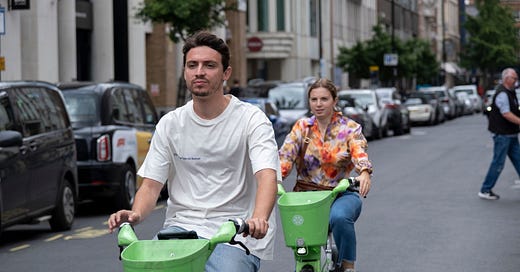Lime says it was profitable in the first half of 2023 🛴 🚲 📈
Ridership also set a new record in the second quarter
A quick update on some new financial news out of micromobility firm Lime, which today announced it was profitable in the first half of the year.
Here are the topline figures from Lime’s H1 release:
>$250 million in gross bookings (+45% y/y)
$27 million in adjusted ebitda
positive GAAP ebitda (no figure disclosed)
This is the second time that Lime has released limited financial data. In February, Lime claimed it was the “first micromobility company to post a full profitable year,” citing 2022 adjusted ebitda of $15 million and $4 million in unadjusted ebitda. That means the company’s adjusted ebitda for the first half of 2023 alone is already up 80% on the entire 2022 year. That certainly seems promising, though it’s hard to analyse without knowing exactly what Lime includes in its adjusted math or how revenue and expenses break down across the different quarters, as micromobility is a highly seasonal business.
Easier to parse are the ridership and gross bookings numbers, which show unambiguous growth. In 2022, Lime said it completed “nearly 120 million trips” and did $466 million in gross bookings. In the first half of this year, by comparison, Lime says it’s racked up more than $250 million in gross bookings. It didn’t give a ridership total for the first half, but said the second quarter was its best ever with more than 40 million trips taken.
“Our year-over-year revenue growth and ability to operate profitably are strong signals for the long-term viability of Lime's business,” Lime CEO Wayne Ting said in a prepared statement. “This record first half is a strong endorsement of our investments in in-house hardware design, operational excellence and cultivating strong relationships with cities.”
Micromobility operators have lately been on a mission to prove they can run a profitable business. US competitor Bird in June reported huge improvement in its net loss, which shrank to $9.3 million in the second quarter from $320 million a year ago. Bird sold late last year to Bird Canada, a separate operator that licensed the Bird name in Canada. The new ownership has since overhauled Bird’s management, including parting ways with founder Travis VanderZanden and CEO Shane Torchiana. The new team has focused on winning and renewing permits with cities, something Bird struggled to do under VanderZanden, as well as deploying its scooters more efficiently and in locations where they’ll get the most use.
⚡️Breaking⚡️: Bird Canada to bail out Bird Global in reverse-takeover
Bird Canada, an independently owned and run Canadian micromobility company (it’s confusing, I know), is merging with struggling e-scooter operator Bird Global Inc. in a transaction valued at $64 million,.
Lime has been laser-focused on achieving profitability under Ting, who was elevated to CEO in May 2020 and before Lime served as chief of staff at Uber under Dara Khosrowshahi. Uber has of course been on its own multiyear journey toward profitability, which it finally achieved in the second quarter with its first-ever operating profit of $326 million (everyone is some kind of profitable!). Uber reached that milestone in part by trimming its business interests to a few core items, like rides and food delivery. One of the things Uber unloaded was Jump Bikes, an e-bikes startup it purchased in 2018. In 2020, Uber led a $170 million investment in Lime and also handed off Jump as part of the deal. The signature red Jump bikes were rebranded and absorbed into the Lime platform.
Lime was founded in 2017, the same year as Bird. Both companies raised lots of money out of the gate from venture capitalists who saw the success of Uber and were eager to win the next big transportation race. Lime’s last big raise was $523 million in November 2021, bringing its total financing to $1.5 billion. Its last known valuation of $510 million came during that 2020 round led by Uber, which was a major markdown from the $2.4 billion valuation it commanded a year earlier. These are obviously old numbers so I wouldn’t put much stock in them other than to say that startup valuations are inherently volatile, especially when correlated with VC enthusiasm.
The company is presumably valued better these days. Lime’s relatively strong past 18 months are a testament to the tight ship Ting runs, especially as capital has become harder to come by, forcing many startups and tech firms to cut costs or make exit plans. As I’ve said many times, a decade of free-flowing investor subsidies helped a lot of startups survive for years without a viable business. These companies could afford to lose money on their operations because, at the end of the day, someone else was footing the bill. High inflation and the end of cheap capital was a make-or-break point, distinguishing those who could cut it from those who couldn’t. European scooter giant Tier Mobility, for instance, has reportedly been on the market since at least the spring amid mounting financial losses.
For Lime, as for Uber, those tough market conditions have been an advantage. “2022 was a hard year for many people, but it’s actually good for the strong players,” Ting told TechCrunch in February. “This is a year where if you can’t make your business work, you’ve got to start shrinking because there’s not free money on the other side.”






Hi Alison, any plans for new content? Been a while.